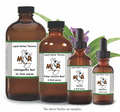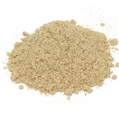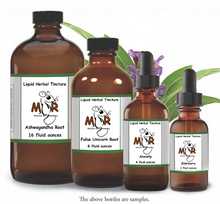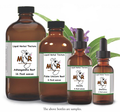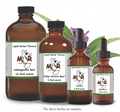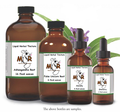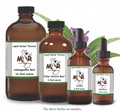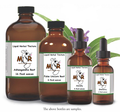 Loading... Please wait...
Loading... Please wait...- Home
- Bulk Herbs
- Herbs (J-L)
- Jiaogulan Herbal Tincture
Jiaogulan Herbal Tincture
Product Description
Jiaogulan Herbal Tincture
Also Known As – Gynostemma pentaphyllum
Wild Crafted – China
Overview - Jiaogulan is a plant that grows wild in China. The leaf is used to make medicine. Jiaogulan is sometimes referred to as “Southern Ginseng” because it grows in south central China and is used in similar ways as ginseng. Jiaogulan is a climbing vine native to China, Japan and Korea. As a member of the Cucurbitaceae family of plants, it is related to the watermelon, cucumber, pumpkin and other melons and gourds. There are several health benefits attributed to drinking jiaogulan tea, with no documented toxicity or drug interactions. However, there are a few potential side effects associated with this herb, including nausea.
Medicinal Uses – Jiaogulan is used for high cholesterol, high blood pressure, and improving heart function. It is also used for strengthening the immune system, increasing stamina and endurance, increasing resistance to environmental stress (as an “adaptogen”), improving memory, and preventing hair loss.
Other uses include treatment of poor appetite, cough, chronic bronchitis, ongoingstomach pain (chronic gastritis), pain and swelling (inflammation), ulcers,constipation, stress, gallstones, obesity, cancer, diabetes, trouble sleeping(insomnia), backache, and pain.
Some people use jiaogulan as an anti-aging agent, antioxidant, and detoxifying agent. It reduces cholesterol levels and increases the “good” high-density lipoprotein (HDL)/total cholesterol ratio in people with high cholesterol levels.
Adaptogenic Benefits: This plant has a long history of use in Traditional Chinese Medicine. In fact, it is known locally as the “herb of immortality” and “Southern Ginseng.” These nicknames likely stem from the Guizhou Province, where the people are reputed to live very long lives as the result of drinking jiaogulan tea daily. Although jiaogulan tea has been consumed as a “Qi” restorative in Southern China since the 15th century, it has been “discovered” by the West only fairly recently.
Modern herbalists classify jiaogulan as an adaptogen, a term used to describe an herb that helps the body resist the effects of stress. Adaptogen herbs also promote homeostasis, which means it helps the body to achieve a state of balance by regulating multiple internal processes. Specifically, adaptogen herbs like jiaogulan address both excessive output and deficiency in certain body systems, most notably the immune system and the endocrine system.
Antioxidant Properties: Jiaogulan contains chemical compounds collectively referred to as gypenosides. According to the drug information database supplied by Drugs.com, jiaogulan gypenosides enhance the function of phagocytes, specialized white blood cells charged with the task of digesting cellular waste products and invading pathogens. These compounds demonstrate similar protective effects in the endothelium, the layer of cells that line the blood vessels.
Researchers at China’s Tangdu Hospital think that jiaogulan gypenosides may offer some protection from oxidative stress in the brain that leads to Parkinson's disease. In the May-June 2010 issue of the Journal of International Medical Research, the scientists reported that the introduction of gypenosides to mouse brains chemically induced to mimic the symptoms of the disease resulted in an increase in glutathione output and superoxide dismutase activity in the substantia nigra, the area of the brain most impacted by Parkinson's disease.
Cholesterol Management: According to Drugs.com, animal-based studies from the 1980s and 1990s have shown that jiaogulan may lower cholesterol. For instance, rats and quail given a decoction, or strong tea, that combined jiaogulan, sacred lotus and Japanese hawthorn, showed a decrease in total cholesterol and triglyceride levels. Similar results were seen in studies where rats were given liquid standardized extracts.
Based on these preliminary studies, researchers from the University of Sydney set out to investigate the effects of jiaogulan gypenosides in rats with induced hyperlipidemia. In the Sept. 16, 2005 edition of the Journal of Pharmacy and Pharmaceutical Sciences, the study team reported that the herb reduced nitrate levels as effectively as the prescription drug atorvastatin. In addition, a decrease in triglyceride and total cholesterol levels were observed.
Special Precautions & Warnings:
Pregnancy and breast-feeding: Jiaogulan is POSSIBLY UNSAFE when taken by mouth during pregnancy. Not enough is known about the safety of jiaogulan during breast-feeding. Stay on the safe side and avoid use.
“Auto-immune diseases” such as multiple sclerosis (MS), lupus (systemic lupus erythematosus, SLE), rheumatoid arthritis (RA), or other conditions: Jiaogulan might cause the immune system to become more active. This could increase the symptoms of auto-immune diseases. If you have an auto-immune condition, it’s best to avoid using jiaogulan until more is known.
Bleeding disorders: Jiaogulan may slow blood clotting. There is a concern that it might make bleeding disorders worse.
Surgery: Jiaogulan might slow blood clotting. There is some concern that it might increase the risk of bleeding during and after surgery. Stop using jiaogulan at least 2 weeks before a scheduled surgery.
Interactions:
-
Medications that decrease the immune system (Immunosuppressants) interacts with JIAOGULAN
Jiaogulan increases the immune system. By increasing the immune system jiaogulan might decrease the effectiveness of medications that decrease the immune system.
Some medications that decrease the immune system include azathioprine (Imuran), basiliximab (Simulect), cyclosporine (Neoral, Sandimmune), daclizumab (Zenapax), muromonab-CD3 (OKT3, Orthoclone OKT3), mycophenolate (CellCept), tacrolimus (FK506, Prograf), sirolimus (Rapamune), prednisone (Deltasone, Orasone), corticosteroids (glucocorticoids), and others. -
Medications that slow blood clotting (Anticoagulant / Antiplatelet drugs) interacts with JIAOGULAN
Jiaogulan might slow blood clotting. Taking jiaogulan along with medications that also slow clotting might increase the chances of bruising and bleeding.
Some medications that slow blood clotting include aspirin, clopidogrel (Plavix), diclofenac (Voltaren, Cataflam, others), ibuprofen (Advil, Motrin, others), naproxen (Anaprox, Naprosyn, others), dalteparin (Fragmin), enoxaparin (Lovenox), heparin, warfarin (Coumadin), and others.
Preparation and Dosage - Suggested: Use 6-12 drops in juice or water, under the tongue or as desired. May be taken 3 times daily. Shake well and store in a cool dark place. Keep out of reach of children.
Disclaimer - The information presented herein by Mountain Maus’ Remedies is intended for educational purposes only. These statements have not been evaluated by the FDA and are not intended to diagnose, cure, treat or prevent disease. Individual results may vary, and before using any supplements, it is always advisable to consult with your own health care provider.
References:
- Drugs.com: Jiaogulan
- Journal of International Medical Research: Neuroprotective Effect of Gypenosides Against Oxidative Injury in the Substantia Nigra of a Mouse Model of Parkinson's Disease; Wang P et al.; May-June 2010
- Journal of Pharmacy and Pharmaceutical Sciences: Phytopreventative Anti-hyperlipidemic Effects of Gynostemma Pentaphyllum in Rats; Megalli S et al.; Sept. 16, 2005







